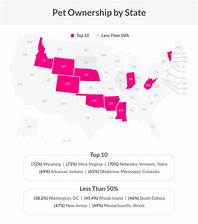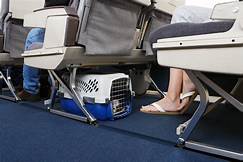What Percentage of Americans Have Pets?
Pets are a beloved part of many American families, providing companionship, unconditional love, and numerous health benefits. But just how common is pet ownership in the United States? This article delves into the statistics and trends surrounding pet ownership in America.

Pet Ownership Statistics in the United States
1. Overall Pet Ownership:
According to the American Pet Products Association (APPA), approximately 67% of U.S. households own at least one pet. This translates to about 85 million households with pets. The most popular pets in America are dogs, followed by cats.
2. Dog Ownership:
Dogs are the most popular pets in the U.S., with an estimated 63.4 million households owning at least one dog. This represents approximately 57% of all households in the country. The most popular dog breeds include French Bulldogs, Labrador Retrievers, and Golden Retrievers.
3. Cat Ownership:
Cats are the second most popular pets in the U.S., with an estimated 47.1 million households owning at least one cat. This translates to about 42% of all households in the country. The most popular cat breeds include Maine Coons, Ragdolls, and Persian cats.
Benefits of Pet Ownership
1. Companionship and Emotional Support:
Pets provide companionship and emotional support to their owners, reducing feelings of loneliness, depression, and anxiety. Interacting with pets has been shown to release oxytocin, a hormone associated with bonding and relaxation.
2. Physical Health Benefits:
Owning a pet can improve physical health in various ways. Walking a dog regularly promotes exercise, leading to better cardiovascular health and weight management. Pets also encourage outdoor activities, reducing sedentary behavior and improving overall fitness.
3. Mental Health Benefits:
Research indicates that interacting with pets can lower blood pressure, reduce stress hormones, and boost mood. Pets provide a sense of purpose and responsibility, which can be particularly beneficial for individuals living alone or dealing with difficult life circumstances.
Challenges of Pet Ownership
1. Financial Costs:
Pet ownership can involve significant financial costs. Aside from the initial cost of acquiring a pet, there are ongoing expenses for food, veterinary care, grooming, and other supplies. Pet owners should carefully consider these costs before bringing a pet into their home.
2. Time Commitment:
Pets require a substantial investment of time and attention. They need regular walks, playtime, training, and grooming. Pet owners should be prepared to dedicate a portion of their daily routine to caring for their pet's needs.
3. Health and Safety Concerns:
Pets can carry diseases and parasites that can be transmissible to humans. Responsible pet owners should follow proper hygiene practices, such as washing hands after handling their pet and cleaning up pet waste promptly. Additionally, pet owners should ensure their pets are up-to-date on vaccinations and receive regular veterinary checkups.
In conclusion, pet ownership is a common practice in the United States, with a significant percentage of households owning at least one pet. Pets provide numerous benefits to their owners, including companionship, emotional support, and health benefits. However, pet ownership also involves responsibilities and challenges, such as financial costs, time commitment, and health and safety concerns. Prospective pet owners should carefully consider these factors before bringing a pet into their home.Declaration: All article resources on this website, unless otherwise specified or labeled, are collected from online resources. If the content on this website infringes on the legitimate rights and interests of the original author, you can contact this website to delete it.





